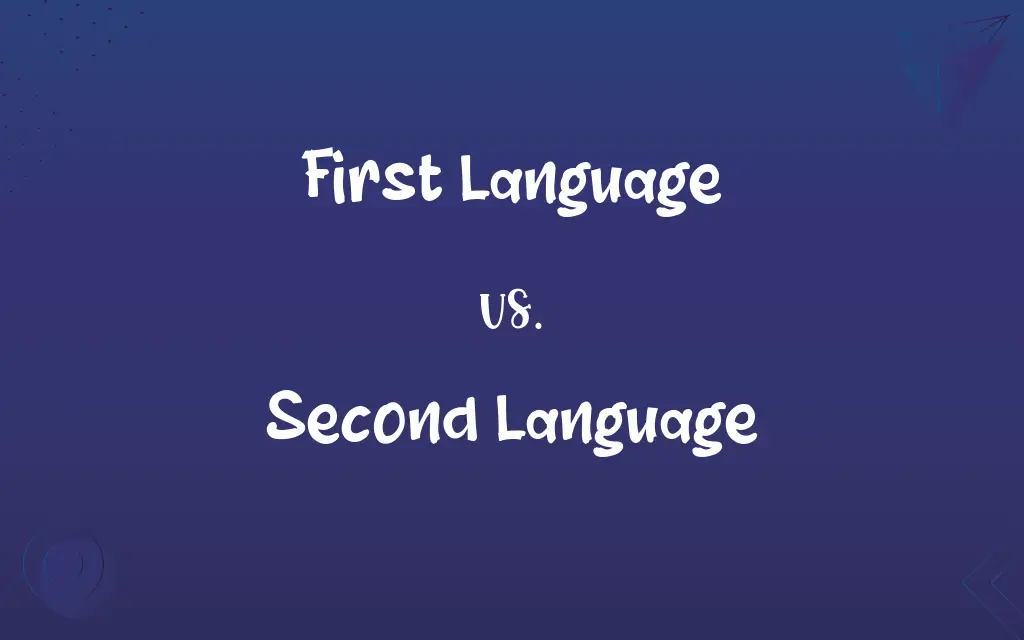First Language vs. Second Language: Know the Difference

By Shumaila Saeed || Published on December 30, 2023
First Language (L1) is the native language learned from birth, while Second Language (L2) is any language learned after the first, often for communication in a non-native context.

Key Differences
The First Language is acquired naturally in the home and community environment during early childhood. In contrast, the Second Language is typically learned in a classroom or formal educational setting, often later in life.
Shumaila Saeed
Dec 30, 2023
Individuals typically achieve a higher proficiency level in their First Language due to early and extensive exposure. The Second Language, however, may not reach the same level of fluency due to later acquisition and limited immersion.
Shumaila Saeed
Dec 30, 2023
The First Language is closely tied to a person's cultural identity and heritage. The Second Language, on the other hand, is often learned for practical reasons, such as work or education, and may not have the same cultural significance.
Shumaila Saeed
Dec 30, 2023
Learning a First Language is a natural part of cognitive development in children. Learning a Second Language, especially at an older age, can be more challenging and requires different cognitive strategies.
Shumaila Saeed
Dec 30, 2023
The First Language is used in a wide range of daily activities and personal interactions. The Second Language might be used in specific contexts, such as professional environments or travel.
Shumaila Saeed
Dec 30, 2023
ADVERTISEMENT
Comparison Chart
Age of Acquisition
Typically acquired from birth
Learned after early childhood
Shumaila Saeed
Dec 30, 2023
Learning Environment
Natural immersion in family and community
Structured educational settings
Shumaila Saeed
Dec 30, 2023
Fluency Level
Generally higher due to early and extensive exposure
Varies, often lower than first language
Shumaila Saeed
Dec 30, 2023
Cultural Significance
Deeply connected to cultural identity
Often learned for practical reasons
Shumaila Saeed
Dec 30, 2023
Cognitive Development
Integral to early cognitive development
Requires different cognitive strategies and effort
Shumaila Saeed
Dec 30, 2023
ADVERTISEMENT
Usage Context
Used in a wide range of everyday activities
Used in specific contexts (e.g., work, education)
Shumaila Saeed
Dec 30, 2023
Emotional Connection
Often has a deeper emotional resonance
May lack the same depth of emotional connection
Shumaila Saeed
Dec 30, 2023
Grammar Mastery
Natural grasp of grammar and nuances
May struggle with grammar and nuances
Shumaila Saeed
Dec 30, 2023
Idiomatic Understanding
Intuitive understanding of idioms and expressions
Learning idioms and expressions can be challenging
Shumaila Saeed
Dec 30, 2023
ADVERTISEMENT
First Language and Second Language Definitions
First Language
First Language is the language used for initial cognitive and linguistic development.
Children's first language shapes their early understanding of the world.
Shumaila Saeed
Dec 12, 2023
Second Language
Second Language is any language learned after the native language.
She learned English as her second language for work.
Shumaila Saeed
Dec 12, 2023
First Language
First Language is the language most fluent and comfortable for an individual.
Even though she speaks three languages, French is her first language.
Shumaila Saeed
Dec 12, 2023
Second Language
Second Language is often spoken less fluently than the native language.
Her second language is Japanese, which she speaks with a slight accent.
Shumaila Saeed
Dec 12, 2023
First Language
First Language is the primary language spoken in one's household during childhood.
English is his first language, so he thinks in English.
Shumaila Saeed
Dec 12, 2023
Second Language
Second Language learning requires conscious effort and education.
He took classes to learn Russian as his second language.
Shumaila Saeed
Dec 12, 2023
First Language
First Language is the native language learned from birth.
Her first language, Spanish, influences her writing style.
Shumaila Saeed
Dec 12, 2023
Second Language
Second Language is acquired for specific purposes like education or work.
He studied German as a second language to attend university in Berlin.
Shumaila Saeed
Dec 12, 2023
First Language
First Language is the language most closely tied to one's cultural identity.
His first language, Hindi, connects him to his heritage.
Shumaila Saeed
Dec 12, 2023
Second Language
Second Language may not have the same emotional resonance as the native language.
Although proficient in Italian as a second language, she feels more at home speaking Spanish.
Shumaila Saeed
Dec 12, 2023
Repeatedly Asked Queries
Can a person have more than one First Language?
Yes, if they are raised bilingual, they can have two first languages.
Shumaila Saeed
Dec 30, 2023
Is it easier to learn a Second Language as a child or an adult?
Generally easier as a child due to more plasticity in the brain.
Shumaila Saeed
Dec 30, 2023
Does knowing a Second Language affect First Language proficiency?
Not usually, but lack of practice can lead to reduced proficiency in the first language.
Shumaila Saeed
Dec 30, 2023
What is a First Language?
The native language learned from birth, typically in the family environment.
Shumaila Saeed
Dec 30, 2023
What is a Second Language?
Any language learned after the first language, often for communication in a non-native context.
Shumaila Saeed
Dec 30, 2023
Why is accent often different in a Second Language?
Because of the influence of the first language's phonetics and the age of acquisition.
Shumaila Saeed
Dec 30, 2023
Is grammar learned differently in a First Language compared to a Second Language?
Yes, first language grammar is acquired naturally, while second language grammar often requires formal education.
Shumaila Saeed
Dec 30, 2023
Can a Second Language become more dominant than a First Language?
Yes, if a person uses the second language extensively over time.
Shumaila Saeed
Dec 30, 2023
Can learning a Second Language improve cognitive skills?
Yes, it can enhance cognitive flexibility, memory, and problem-solving skills.
Shumaila Saeed
Dec 30, 2023
Are there any critical periods for First Language acquisition?
Yes, the critical period for natural language acquisition is typically before puberty.
Shumaila Saeed
Dec 30, 2023
Can learning a Second Language change the way you think?
Yes, it can influence thought patterns and cultural perspectives.
Shumaila Saeed
Dec 30, 2023
Does the culture of the First Language influence Second Language learning?
Yes, cultural background can influence the approach and attitude towards learning a second language.
Shumaila Saeed
Dec 30, 2023
Is it important to maintain the First Language?
Yes, for cultural identity, family communication, and cognitive benefits.
Shumaila Saeed
Dec 30, 2023
How does Second Language learning differ from First Language acquisition?
Second language learning often requires more explicit instruction and conscious effort.
Shumaila Saeed
Dec 30, 2023
Why do some people learn a Second Language more easily than others?
Factors include age, motivation, language exposure, and individual learning styles.
Shumaila Saeed
Dec 30, 2023
Is it common to mix First and Second Languages while speaking?
Yes, this phenomenon is known as code-switching.
Shumaila Saeed
Dec 30, 2023
How can I improve my Second Language proficiency?
Through practice, immersion, and consistent use of the language.
Shumaila Saeed
Dec 30, 2023
Can losing proficiency in a First Language impact identity?
Yes, it can affect cultural connections and personal identity.
Shumaila Saeed
Dec 30, 2023
Does the method of learning differ between a First and Second Language?
Yes, first language is learned more naturally, while second language often involves structured learning methods.
Shumaila Saeed
Dec 30, 2023
Is bilingualism the same as having a Second Language?
Not exactly; bilingualism implies high proficiency in both languages, while having a second language doesn’t necessarily imply equal proficiency.
Shumaila Saeed
Dec 30, 2023
Share this page
Link for your blog / website
HTML
Link to share via messenger
About Author
Written by
Shumaila SaeedShumaila Saeed, an expert content creator with 6 years of experience, specializes in distilling complex topics into easily digestible comparisons, shining a light on the nuances that both inform and educate readers with clarity and accuracy.









































































